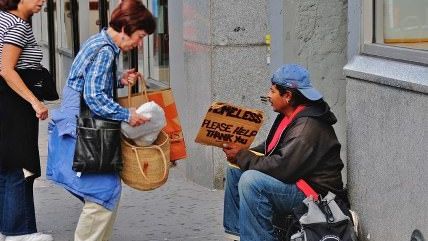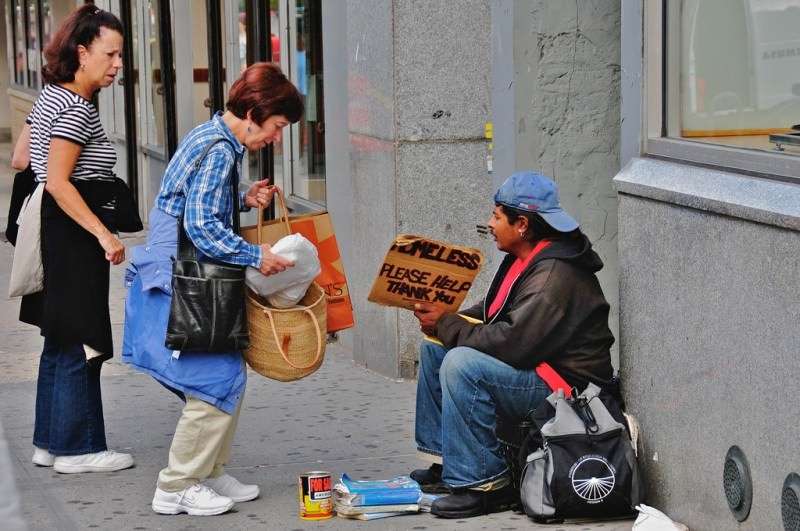There's No Begging Exception to the First Amendment
Laws against panhandling are unconstitutional, yet officials keep trying.


"Do you have the time?"
"Would you please sign a petition to support tougher clean-air rules?"
"Have you accepted Jesus Christ as your lord and savior?"
"Excuse me, but could you help out a fellow American who's down on his luck?"
In many American cities, you can ask the first three of those questions on a public street without any trouble. But if you ask the fourth, you can be arrested and jailed.
Laws against panhandling have been around for decades. In case after case, courts have ruled them unconstitutional. But municipal leaders around the country keep looking for ways to impose them.
The 4th Circuit Court of Appeals recently slapped down Henrico County, Virginia's ordinance. Until 2012 the county prohibited people who were standing in the road to distribute handbills, sell merchandise, or solicit contributions from motorists or passengers. So panhandlers asked for money sitting down. The county amended the ordinance to prohibit such activities outright, although it continued to permit, say, election volunteers to yell "Vote for Smith!" at passing motorists. Henrico claimed this was a distinction based on the "transactional" nature of soliciting and handbilling, which present greater safety issues.
Maybe so, said the court, but the county offered no evidence that this was a problem anywhere but a few select intersections. Besides, it offered no evidence that it tried to address the safety problem in other ways, but without success. For instance, it never prosecuted a panhandler for blocking traffic.
That decision followed by just a few days another in which Charlottesville, Virginia's panhandling ordinance also was struck down. The city had tried to keep beggars from a couple of locations on its Downtown Mall, using the same public-safety fig leaf Henrico used. Federal district judge Norman Moon didn't buy it.
"My examination of the record reflects that the City's focus was on panhandlers, and the City created an ordinance reflecting that focus," he wrote. What's more, "the City offers insufficient justification (much less a good explanation) for the fifty-foot measurement of the so-called buffer zone. There are other laws that permit the City to protect the public safety without burdening speech rights."
Both of those rulings leaned for support on the Supreme Court's ruling against buffer zones around abortion clinics in Massachusetts. Those zones allowed clinic personnel to counsel women on the street, but kept anti-abortion activists from doing the same—a flagrantly unconstitutional restriction based on the content of the speaker's message.
Anti-panhandling ordinances often amount to the same thing, especially when they exempt other sorts of speakers—street preachers, campaign volunteers, political protesters—from similar restraints. And everyone knows why: Panhandlers, who are usually homeless, often look like heck and smell even worse, and that's bad for business. As one Honolulu city councilman said regarding an anti-panhandling ordinance there, he wanted "to make sure tourists are comfortable visiting Hawaii and are not constantly accosted for money." In other words, he wanted to help Honolulu businesses rake in more money by ensuring Honolulu beggars raked in less. Nice.
Whether the laws are nice or not, however, is an ancillary issue. The principal question is whether begging constitutes free speech. Time after time, courts have ruled that it does. "There is no question that panhandling and solicitation of charitable contributions are protected speech," said the 4th Circuit last week. Two years ago, the 6th Circuit noted in a Michigan case that the Supreme Court has protected solicitation by groups, and—citing decisions in the Second, 11th, and 4th (the latter, again, concerning the Charlottesville ban)—held that individual "begging is a form of solicitation that the First Amendment protects" as well.
The Michigan case involved such appeals for help as signs reading "Cold and Hungry, God Bless" and "Need Job, God Bless," as well as the verbal appeal, "Can you spare a little change?" It's impossible to argue with a straight face that such communication is not speech—and, moreover, speech that harms no one.
Michigan claimed it wanted to prevent fraud (some homeless people use donations to buy booze and drugs, not food and shelter). In that case, the court said, the state should ban fraud. Banning all panhandling to prevent potential fraud is like banning all religious worship to prevent human sacrifice.
Of course, sometimes the people with their hands out can be downright menacing. They don't simply ask for your money, they rudely demand it. They tell you how much you have to pay. And then they threaten to make your life miserable if you don't comply.
We don't call them the panhandlers, though. We call them politicians.


Show Comments (57)